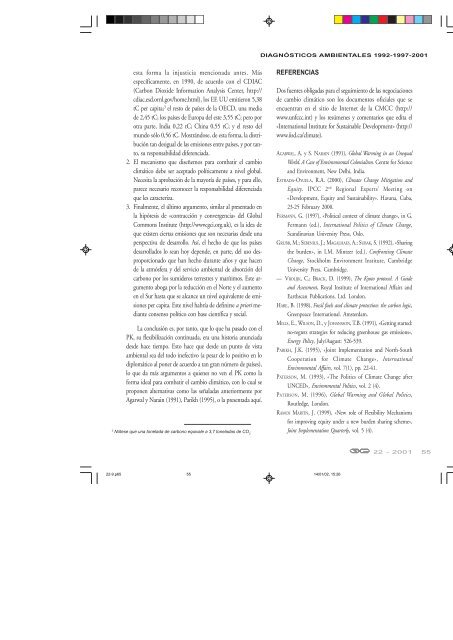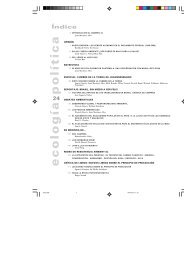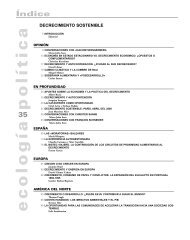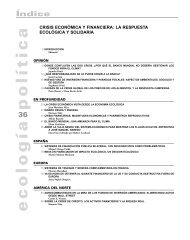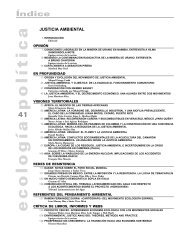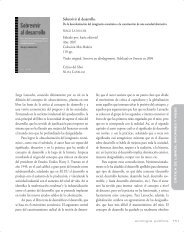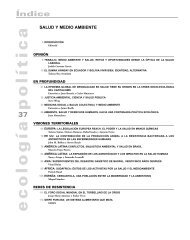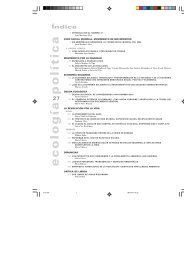archivo de contenidos - EcologÃa PolÃtica
archivo de contenidos - EcologÃa PolÃtica
archivo de contenidos - EcologÃa PolÃtica
You also want an ePaper? Increase the reach of your titles
YUMPU automatically turns print PDFs into web optimized ePapers that Google loves.
DIAGNÓSTICOS AMBIENTALES 1992-1997-2001<br />
esta forma la injusticia mencionada antes. Más<br />
específicamente, en 1990, <strong>de</strong> acuerdo con el CDIAC<br />
(Carbon Dioxi<strong>de</strong> Information Analysis Center, http://<br />
cdiac.esd.ornl.gov/home.html), los EE UU emitieron 5,38<br />
tC per capita; 3 el resto <strong>de</strong> países <strong>de</strong> la OECD, una media<br />
<strong>de</strong> 2,45 tC; los países <strong>de</strong> Europa <strong>de</strong>l este 3,55 tC; pero por<br />
otra parte, India 0,22 tC; China 0,55 tC; y el resto <strong>de</strong>l<br />
mundo sólo 0,56 tC. Mostrándose, <strong>de</strong> esta forma, la distribución<br />
tan <strong>de</strong>sigual <strong>de</strong> las emisiones entre países, y por tanto,<br />
su responsabilidad diferenciada.<br />
2. El mecanismo que diseñemos para combatir el cambio<br />
climático <strong>de</strong>be ser aceptado políticamente a nivel global.<br />
Necesita la aprobación <strong>de</strong> la mayoría <strong>de</strong> países, y para ello,<br />
parece necesario reconocer la responsabilidad diferenciada<br />
que les caracteriza.<br />
3. Finalmente, el último argumento, similar al presentado en<br />
la hipótesis <strong>de</strong> «contracción y convergencia» <strong>de</strong>l Global<br />
Commons Institute (http://www.gci.org.uk), es la i<strong>de</strong>a <strong>de</strong><br />
que existen ciertas emisiones que son necesarias <strong>de</strong>s<strong>de</strong> una<br />
perspectiva <strong>de</strong> <strong>de</strong>sarrollo. Así, el hecho <strong>de</strong> que los países<br />
<strong>de</strong>sarrollados lo sean hoy <strong>de</strong>pen<strong>de</strong>, en parte, <strong>de</strong>l uso <strong>de</strong>sproporcionado<br />
que han hecho durante años y que hacen<br />
<strong>de</strong> la atmósfera y <strong>de</strong>l servicio ambiental <strong>de</strong> absorción <strong>de</strong>l<br />
carbono por los sumi<strong>de</strong>ros terrestres y marítimos. Este argumento<br />
aboga por la reducción en el Norte y el aumento<br />
en el Sur hasta que se alcance un nivel equivalente <strong>de</strong> emisiones<br />
per capita. Este nivel habría <strong>de</strong> <strong>de</strong>finirse a priori mediante<br />
consenso político con base científica y social.<br />
La conclusión es, por tanto, que lo que ha pasado con el<br />
PK, su flexibilización continuada, era una historia anunciada<br />
<strong>de</strong>s<strong>de</strong> hace tiempo. Esto hace que <strong>de</strong>s<strong>de</strong> un punto <strong>de</strong> vista<br />
ambiental sea <strong>de</strong>l todo inefectivo (a pesar <strong>de</strong> lo positivo en lo<br />
diplomático al poner <strong>de</strong> acuerdo a tan gran número <strong>de</strong> países),<br />
lo que da más argumentos a quienes no ven el PK como la<br />
forma i<strong>de</strong>al para combatir el cambio climático, con lo cual se<br />
proponen alternativas como las señaladas anteriormente por<br />
Agarwal y Narain (1991), Parikh (1995), o la presentada aquí.<br />
3<br />
Nótese que una tonelada <strong>de</strong> carbono equivale a 3,7 toneladas <strong>de</strong> CO 2<br />
.<br />
REFERENCIAS<br />
Dos fuentes obligadas para el seguimiento <strong>de</strong> las negociaciones<br />
<strong>de</strong> cambio climático son los documentos oficiales que se<br />
encuentran en el sitio <strong>de</strong> Internet <strong>de</strong> la CMCC (http://<br />
www.unfccc.int) y los resúmenes y comentarios que edita el<br />
«International Institute for Sustainable Development» (http://<br />
www.iisd.ca/climate).<br />
AGARWAL, A. y S. NARAIN (1991), Global Warming in an Unequal<br />
World. A Case of Environmental Colonialism. Centre for Science<br />
and Environment, New Delhi, India.<br />
ESTRADA-OYUELA, R.A. (2000), Climate Change Mitigation and<br />
Equity. IPCC 2 nd Regional Experts’ Meeting on<br />
«Development, Equity and Sustainability». Havana, Cuba,<br />
23-25 February 2000.<br />
FERMANN, G. (1997), «Political context of climate change», in G.<br />
Fermann (ed.), International Politics of Climate Change,<br />
Scandinavian University Press, Oslo.<br />
GRUBB, M.; SEBENIUS, J.; MAGALHAES, A.; SUBAK, S. (1992), «Sharing<br />
the bur<strong>de</strong>n», in I.M. Mintzer (ed.), Confronting Climate<br />
Change, Stockholm Environment Institute, Cambridge<br />
University Press, Cambridge.<br />
— VROLIJK, C.; BRACK, D. (1999), The Kyoto protocol. A Gui<strong>de</strong><br />
and Assessment, Royal Institute of International Affairs and<br />
Earthscan Publications, Ltd. London.<br />
HARE, B. (1998), Fossil fuels and climate protection: the carbon logic,<br />
Greenpeace International. Amsterdam.<br />
MILLS, E., WILSON, D., y JOHANSSON, T.B. (1991), «Getting started:<br />
no-regrets strategies for reducing greenhouse gas emissions»,<br />
Energy Policy, July/August: 526-539.<br />
PARIKH, J.K. (1995), «Joint Implementation and North-South<br />
Cooperation for Climate Change», International<br />
Environmental Affairs, vol. 7(1), pp. 22-41.<br />
PATERSON, M. (1993), «The Politics of Climate Change after<br />
UNCED», Environmental Politics, vol. 2 (4).<br />
PATERSON, M. (1996), Global Warming and Global Politics,<br />
Routledge, London.<br />
RAMOS MARTÍN, J. (1999), «New role of Flexibility Mechanisms<br />
for improving equity un<strong>de</strong>r a new bur<strong>de</strong>n sharing scheme»,<br />
Joint Implementation Quarterly, vol. 5 (4).<br />
22 - 2001 55<br />
22-9.p65 55<br />
14/01/02, 15:26


